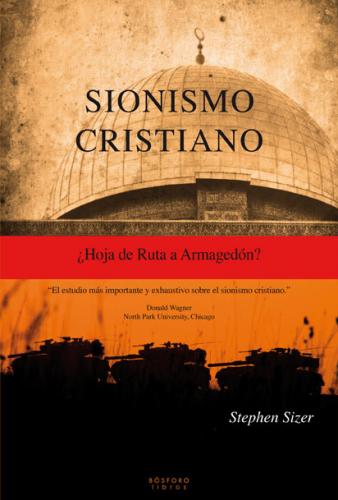
“I am glad to commend Stephen Sizer’s ground-breaking critique of Christian Zionism. His comprehensive overview of its roots, its theological basis and its political consequences is very timely. I myself believe that Zionism, both political and Christian, is incompatible with biblical faith. Stephen’s book has helped to reinforce this conviction.” Revd John Stott, Rector Emeritus, All Soul’s, Langham Place, London, the principal framer of the Lausanne Covenant (1974) and founder of the Langham Partnership International.
“This is a very fine and important book. All Christians who believe that Jesus favoured peacemakers, should read it and realise what terrible harm is being done in the name of Christianity. And all who are concerned about the Israeli/Palestinian conflict should read it to understand how Christian Zionism disables the US as fair minded mediator. European foreign policy thinkers should read it,because this distortion of US political space, puts a greater responsibility on European governments to stand up for justice and international law” Right Hon. Clare Short, former British Secretary of State for International Development.
Read my University of Middlesex PhD thesis
Endorsements of Christian Zionism: Roadmap to Armageddon?
Christian Zionism: Roadmap to Armageddon?
An introductory article What is Christian Zionism?
The following three chapters are a summary of my book:
Christian Zionism Master History (part 1)
Christian Zionism Master Theology (part 2)
Christian Zionism Master Politics (part 3)
The following were research chapters that were later edited and included in the book:
Chapter 1: Christian Zionism Defined
Chapter 2: A History of Christian Zionism
Chapter 3: Edward Irving (1792-1834) The Origins of the Rapture Doctrine
Chapter 4: John Nelson Darby (1800-1882) The Father of Dispensationalism
Chapter 5: Cyrus Scofield (1843-1921) and the Rise of Modern Dispensationalism
Chapter 6: Hal Lindsey and Armageddon Theology
Chapter 7: The International Christian Embassy Jerusalem
Chapter 8: The Hermeneutics of Christian Zionism Critiqued
Chapter 9: The Jewish Temple within Christian Zionism
Jerusalem Paper for Arab League Conference
Paper delivered at the Qatar Conference on Jerusalem 26-27 February, 2012.
The Jerusalem Declaration on Christian Zionism
The Jerusalem Declaration (2006) x
Israel and the Church: Seven Biblical Answers
What is the relationship between Israel and the Church? This short paper refutes the seven most popular assertions of Christian Zionism.
Seven Biblical Answers
Critical Acclaim and Reviews by:
Graham Beynon
Paul Boyer
Gordon Bridger
Mark Chmiel
Kenneth Cragg
Phil Groom
Jeff Halper
Charles Kimball
Anthony McRoy
Michael Spath
Stephen Travis
Scott Waalkes
Peter Walker
Donald Wagner
1. The historical roots of Christian Zionism
The early intimations: proto-Christian Zionism The socio-political context for the rise of Christian Zionism The origins of covenantal premillennial restorationism in Britain The origins of dispensational Christian Zionism in Britain Lord Shaftesbury and the influence of restorationism upon British foreign policy British Christian political support for the Jewish Zionist movement The Balfour Declaration and the implementation of the Zionist vision Dispensationalism and the birth of Christian Zionism in America (1859 – 1945) Anti-Semitism and American liberal Christian Zionism (1918 – 1967) Contemporary American evangelical Christian Zionism (1967 – 2002) The proliferation and diversification of Christian Zionist organizations The historical roots of Christian Zionism: conclusions
2. The theological emphases of Christian Zionism
The Bible: a literal futurist hermeneutic Chosen peoples: the relationship between Israel and the church Restorationism: the return of the Jews to Zion Eretz Israel: reclaiming Judea, Samaria and beyond Jerusalem: the eternal and exclusive Jewish capital The temple: rebuilding for desecration The future: the eschatology of Christian Zionism The distinctive theology of Christian Zionism: conclusions .
3. The political implications of Christian Zionism
The chosen people: supporting Israeli colonialism Restorationism: facilitating aliyah from Russia and Eastern Europe Eretz Israel: sustaining the West Bank settlements Jerusalem: lobbying for international recognition The temple: identifying with religious Zionism The future: opposing peace and hastening Armageddon The political implications of Christian Zionism: conclusions
4. Conclusions
Observations on the development of Christian Zionism Variant forms of Christian Zionism The constructive and destructive aspects of Christian Zionism A critical assessment of Christian Zionism Biblical Zionism: a convenantal alternative
FOREWORD
Evangelical Christians are sometimes accused of not being sufficiently interested in politics and not contributing to the great debates about social welfare in our world today. ‘Too heavenly minded to be of any earthly use’, is the charge. While there may often be truth in this accusation, Stephen Sizer’s challenging study of Christian Zionism demonstrates that there is at least one area in contemporary politics where this is decidedly not so. But is the influence of Christian Zionism valid and helpful? Is the theological basis of this political stance misguided and the outcome contrary to God’s will?
Stephen’s careful survey of this movement demonstrates that theology really matters and, if the theology is wrong, the consequences are disastrous. Prior to examining the theological position of the various strands of Christian Zionism, Stephen devotes his first chapter to an historical exploration of the development of this movement. He traces the transition of Christian Zionism from early nineteenth-century rural England to mainstream American evangelicalism in the twentieth century.
He notes the historical and interpretative reasons why Christian Zionism evolved into different schools of thought. Then he launches into a theological analysis and critique of those positions in his second chapter.
Seven basic theological tenets are accepted in varying degrees by evangelical Christian Zionists. The foundation upon which the other tenets are based is a literalist hermeneutic and a consistently futurist reading of prophecy. Quite apart from the political outcome of this way of reading the Bible, there are serious implications for the church and the gospel. At heart of the problem, he claims, there is actually a devaluing of the significance of the Lord Jesus Christ and his atoning work for Israel and the nations.
The third chapter of this book shows how the belief that the Jews remain God’s chosen people (apart from Christ and his church) leads Christian Zionists to endorse and justify many of the current policies of the Israeli government, including the annexation and settlement of Palestinian-owned land. The return of Jews to Israel is actively encouraged and facilitated. Western governments are pressured to relocate their embassies to Jerusalem and to recognize this as the eternal and exclusive capital of the Jews.
Those who believe that Scripture predicts the rebuilding of the temple in Jerusalem and a reinstitution of the priesthood and sacrificial system offer varying degrees of support to Jewish Temple Mount organizations committed to achieving this end. Moreover, as Stephen concludes, since Christian Zionists are convinced there will be an apocalyptic war between good and evil in the near future, there is no prospect for lasting peace between Jews and Arabs. Indeed, to advocate that Israel compromise with Islam or coexist with Palestinians is to identify with those destined to oppose God and Israel in the imminent battle of Armageddon (p. 252).
Stephen shows that the New Testament must be our guide in understanding how the Old Testament has been fulfilled for us in Christ and in judging what remains to be worked out in history. Every Christian needs to be clear about the way the Bible fits together, observing the way the inspired writers of the New Testament reveal this. But especially those who presume to tell us how the future will unfold need to be sure that they are not misusing the Bible and, in their misguided zeal, dishonouring God. I hope that Christian Zionists who read this book will recognize that it is written by someone who believes in the inspiration and authority of Scripture as they do, and will consider carefully the challenge he brings to their particular line of interpretation. David Peterson Oak Hill College, London Extract from the
INTRODUCTION
Underneath the beautiful Sea of Galilee lies a hidden fault-line that runs down from Mount Hermon through the Jordan Valley to the Red Sea, the Arabian peninsula and on to the heart of East Africa. Over thousands of years, earthquakes along this fault-line have devastated countless civilizations. Today there is a human fault-line running through the same land – a fault-line that is largely hidden from view until it erupts in violence. The cause of these volcanic eruptions has to do with the pressure of two peoples, like two tectonic plates, trying to occupy the same land – one the military occupier, the other the occupied. The media present this as a clash between two cultures, Palestinian and Israeli or Oriental and Western. As I hope to show, the convictions of Christian Zionists have made a significant contribution to the Israeli–Palestinian conflict.
Zionism defined
In general terms, Zionism may be defined as ‘the national movement for the return of the Jewish people to their homeland and the resumption of Jewish sovereignty in the Land of Israel’. The term ‘Zionism’ was first coined in 1892 by Nathan Birnbaum, then a student in Vienna. A year later he published a booklet entitled, The National Rebirth of the Jewish People in Its Homeland as a Means of Solving the Jewish Problem, in which he advocated Jewish nationalistic ideas that Theodor Herzl was to later expound in A Jewish State, published in 1896. At the First World Zionist Congress, which Herzl convened in Basle a year later, he and Birnbaum articulated the deep longings of many Jewish people for their own homeland. Various strands of Zionism emerged in the early twentieth century including practical, socialist and communist.
The most recent and probably most destructive form to appear is known as Messianic Zionism. Distinct from much more traditional and less extreme expressions of Zionism, this is associated with individuals like Rabbi Kahne and Gershon Salomon, together with the Gush Emunim movement and the Temple Mount Faithful. Messianic Zionism was spawned from within the ultra-Orthodox subcultures of the ‘Charedi Bible-belt’ around Jerusalem following the 1967 ‘Six Day War’. The Charedim (ultra-Orthodox Jews) were, according to Sachar, ‘the first to embrace the territorialist mysticism inherent in the 1967 triumph’ and came to be a decisive factor in Likud’s electoral victory in 1997. Equating Arabs with the ancient Amalekites, and convinced they have a divinely ordained mandate to carry out ethnic cleansing of the Palestinians from Israel, religious Zionists have been in the forefront of the illegal occupation of Palestinian land, attacks on Muslims and mosques and the systematic expansion of the West Bank settlements, especially in places like Arab East Jerusalem and Hebron. Ironically, the Zionist vision which initially called simply for a ‘publicly secured and legally assured homeland for the Jews in Palestine’, was largely nurtured and shaped by Christians long before it was able to inspire wide-spread Jewish support. As will be shown in chapter one, proto-Christian Zionism predated and nurtured Jewish Zionism, while the contemporary Christian Zionist movement emerged only after 1967, alongside Messianic Zionism, in part in reaction to the widespread criticism Israel has endured over the last thirty-five years.
Christian Zionism defined
At its simplest, Christian Zionism is a political form of philo-Semitism, and can be defined as ‘Christian support for Zionism’. The term ‘Christian Zionist’ first appears to have been used by Theodor Herzl to describe Henri Dunant, the Swiss philanthropist and founder of the Red Cross. Dunant was one of only a handful of Gentiles to be invited to the First World Zionist Congress. Walter Riggans interprets the term in an overtly political sense as ‘any Christian who supports the Zionist aim of the sovereign State of Israel, its army, government, education etc., but it can describe a Christian who claims to support the State of Israel for any reason’. Evangelicals, in particular, are increasingly polarized as to whether Christian Zionism is biblical and orthodox or heretical and cultic. Two mutually exclusive positions have emerged – that of covenantalism and dispensationalism. …



